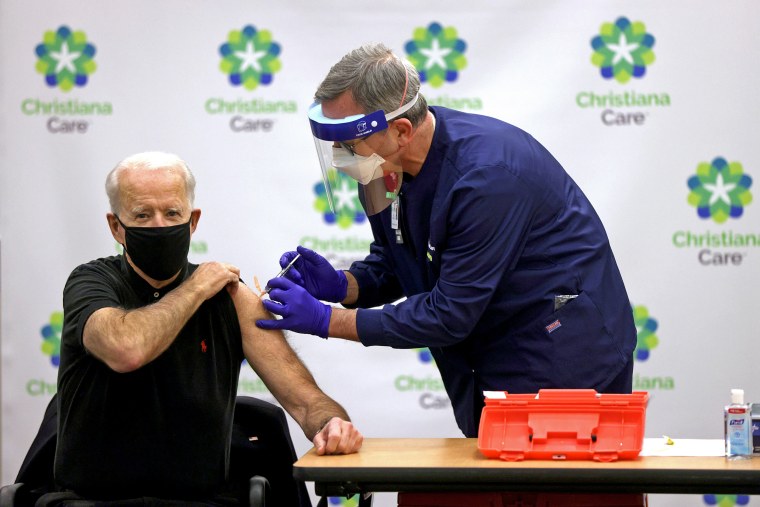WASHINGTON — As the Biden administration tries to streamline the federal government’s pandemic response, it’s also gearing up for a sweeping campaign encouraging Americans to get the coronavirus vaccination when it becomes available to them, according to administration officials.
That effort for now, however, is narrowly targeted at Americans who are eligible to receive the vaccination — particularly among communities where people may be skeptical of taking the shots — as the government grapples with low supply issues, officials said.
“The last thing we want to do is say, ‘Go out and get your shot,’ if there’s no supply,” an administration official explained.
Full coverage of the coronavirus outbreak
The targeted campaigns that have already begun in the Biden administration’s initial weeks are largely focused on minorities, and there have been some efforts to address vaccine hesitancy in rural communities and among military families, according to officials.
Several new efforts to reduce vaccine hesitancy that the Biden administration initiated are aimed at Black Americans, 43 percent of whom say they want to “wait and see” how the vaccine works for others before getting it themselves, according to a recent survey by the Kaiser Family Foundation.
For one new effort, the Centers for Disease Control and Prevention is working with NFL Alumni Health, including legendary players Warren Moon and Franco Harris, to encourage African Americans to get the vaccine.
The CDC also is funding efforts for groups like the National Urban League and the Conference of National Black Churches to build confidence in the vaccine. And there’s a new social media campaign — #VaccineReady — during Black History Month to reduce vaccine hesitancy, facilitated by the Office of Minority Health at the Department of Health and Human Services.
On Monday, Morehouse School of Medicine, in partnership with HHS, plans to launch its National Covid-19 Resiliency Network that includes a digital component that helps people find locations for coronavirus testing and the vaccine using their ZIP codes.
At the same time, the administration is trying to reduce skepticism about the vaccine within other communities, including military families. On Thursday, first lady Jill Biden, Dr. Anthony Fauci and the Chairman of the Joint Chiefs of Staff Mark Milley appeared in a virtual forum with Blue Star Families to encourage members of the military and their families to get the vaccination. “When your turn comes up, please get vaccinated,” Fauci told the forum.
Blue Star Families CEO Kathy Roth-Douquet said the group found in a recent survey that more than half of the respondents “did not feel comfortable at this time getting the vaccine, and many remain undecided.”
“Their concerns range from distrust of the vaccine development process to its safety, overall efficacy and to the potential for unknown side effects,” she said during the virtual event.
Similar concerns are found in rural communities. The Kaiser Family Foundation survey found that residents in rural America are far more likely to say they will “definitely not” get the vaccination than those in urban areas, by a difference of 21 precent to 8 percent.
Beyond some of the targeted vaccine-confidence efforts, much of the messaging coming from the Biden administration is familiar: wear a mask, socially distance.
Download the NBC News app for full coverage of the coronavirus outbreak
For a broader campaign when the vaccine supply has increased, administration officials are looking for ways companies might help, exploring ideas such as giving employees a day off of work to get the vaccination. They’re also discussing how to reach a range of audiences, possibly through sports organizations from the NFL to NASCAR and a range of celebrities to local doctors and pastors in communities across the country.
“Certainly part of our commitment is launch a massive public affairs campaign,” White House press secretary Jen Psaki said Friday. “Takes a little time to get all your ducks in a row and get that going, but part of what we're also trying to do is utilize our experts to be out there publicly.”
The administration faces significant challenges in reaching its goal of herd immunity by the summer, as evidenced by a Monmouth poll released Wednesday.
More Americans are expressing concern about the impact of the coronavirus than at any time during the pandemic, it found. Even so, 1 in 4 of those polled say they will avoid getting the vaccine if they can help it.
CORRECTION (Feb. 6, 2021, 1:39 p.m. ET): A previous version of this article misstated the name of the government's primary health agency. It is the Centers for Disease Control and Prevention, not the Centers for the Disease Control.

